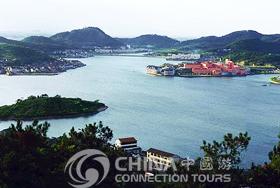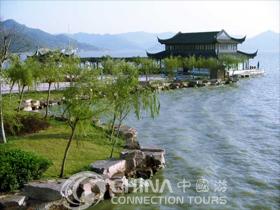 Dongqian Lake has a vast body of water and a winding waterfront. It is China's first fresh-water fishing farm with abundant resources. It is surrounded with so many mountains in all directions that the mountains and the lake crisscross in turn forming a copy of beautiful mountain and water Chinese drawing. Being a provincial scenic spot as well as a comprehensive tourist resort for travel, entertainment and vacation, the Dongqian Lake Scenic Site consists of three lakes, namely, the Grain Lake, South Lake and North Lake. There are also large amounts of inscribed stones for the tombs built in the Southern Song Dynasty around the lake. The finely carved stone and the gracefully designed pattern on the stone fill in the gaps of both the sculpture and the art of the Southern Song Dynasty in Chinese history of sculpture and arts.
Dongqian Lake has a vast body of water and a winding waterfront. It is China's first fresh-water fishing farm with abundant resources. It is surrounded with so many mountains in all directions that the mountains and the lake crisscross in turn forming a copy of beautiful mountain and water Chinese drawing. Being a provincial scenic spot as well as a comprehensive tourist resort for travel, entertainment and vacation, the Dongqian Lake Scenic Site consists of three lakes, namely, the Grain Lake, South Lake and North Lake. There are also large amounts of inscribed stones for the tombs built in the Southern Song Dynasty around the lake. The finely carved stone and the gracefully designed pattern on the stone fill in the gaps of both the sculpture and the art of the Southern Song Dynasty in Chinese history of sculpture and arts.
The Dongqian Lake is the largest freshwater lake in Zhejiang Province, 15km southeast of the urban district of Ningbo city, is situated among the many towns of Yin County such as Xiashui, Hanling, Mozhi and Gaoqian. It is 6.5km wide from east to west and 8.5km long from south to north, and has a perimeter of 45km and an area of 22km2 (now 20km2), three times the area of the famous West Lake in Hangzhou. In the ancient times, it was called Qian Lake, so named because the lake held the water from Qian Dam, and Wanjin Lake. In Tang and Sony Dynasty, it was also called West Lake and East Lake; it is because the change in county boundaries resulted in the change in position of the lake within the boundaries.
With a history of 1200 years, The man-made Dongqian Lake has the most famous spots of interest, which are the Ten Spots known as, "Xia Yu Suo Lan" (The Mist in Islets at Sunrise), "Er Ling Xi Zhao" (The Sunset at the Pagoda of the Sun and the Moon), "Bai Shi Xian Ping" (the White Stone of Gods), to name just a few. In the area, there are over 70 historic sites including the South-Song-Dynasty's "Butuo Dong Tian" (the Buddhist  Paradise), the Yuan-Dynasty's "Pagoda of the Sun and the Moon", the Song-Dynasty's "Wang An-shi Temple" and above 200 stone carvings made in the South Song Dynasty. Of these sites, 21 are cultural historic ones protected by the governments. Now, four areas open to tourists: "Xia Yu Er Ling" (The Sun and the Moon over Islets), "Ping Shui Lu Ting" (Reed Marshes on the Quiet Lake), Memorial Halls of Famous People and Area for Vacations. Some of the main spots of these areas are "Butuo Dong Tian" (the Buddhist Paradise), "Pagoda of the Sun and the Moon", "Memorial Hall of Wang An-shi", "Temple of Yue Fei", the Statue of Shen Guangwen, the Museum of Paintings and Calligraphic Works of Sha Menghai, the famous artist, Memorial Entomological Museum of the famous entomologist Zhou Yao, Centre of National Defense Education, Butterfly Exhibition Hall, the Lakeside Park, and many more.
Paradise), the Yuan-Dynasty's "Pagoda of the Sun and the Moon", the Song-Dynasty's "Wang An-shi Temple" and above 200 stone carvings made in the South Song Dynasty. Of these sites, 21 are cultural historic ones protected by the governments. Now, four areas open to tourists: "Xia Yu Er Ling" (The Sun and the Moon over Islets), "Ping Shui Lu Ting" (Reed Marshes on the Quiet Lake), Memorial Halls of Famous People and Area for Vacations. Some of the main spots of these areas are "Butuo Dong Tian" (the Buddhist Paradise), "Pagoda of the Sun and the Moon", "Memorial Hall of Wang An-shi", "Temple of Yue Fei", the Statue of Shen Guangwen, the Museum of Paintings and Calligraphic Works of Sha Menghai, the famous artist, Memorial Entomological Museum of the famous entomologist Zhou Yao, Centre of National Defense Education, Butterfly Exhibition Hall, the Lakeside Park, and many more.
